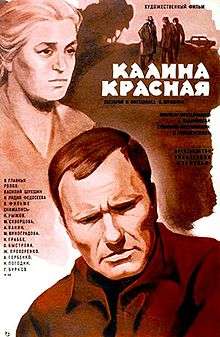The Red Snowball Tree
| The Red Snowball Tree | |
|---|---|
 Original film poster | |
| Directed by | Vasily Shukshin |
| Written by | Vasily Shukshin |
| Starring |
Vasily Shukshin Lidiya Fedoseyeva-Shukshina Georgi Burkov Ivan Ryzhov Maria Skvortsova |
| Music by | Pavel Chekalov |
| Cinematography | Anatoli Zabolotsky |
Production company | |
Release date | 1974 |
Running time | 101 minutes |
| Country | Soviet Union |
| Language | Russian |
| Budget | 289 000 roubles[1] |
The Red Snowball Tree (Russian: Калина красная, translit. Kalina krasnaya) is a 1974 Soviet drama film directed by Vasily Shukshin. It was the most successful film of that year.[2] In total the film was watched by over 140 million people.[1] German film director and screenwriter Rainer Werner Fassbinder included The Red Snowball Tree in the top ten of his favorite films.[3]
Plot
Coming out of the penal colony, a thief-recidivist Yegor Prokudin (Vasili Shukshin) nick-named Grief decides to go to the village where the blue-eyed stranger Lyuba (Lidiya Fedoseyeva-Shukshina), with whom he corresponded by letters, lives. He needs to wait out and to look around. Lyuba appears to love him genuinely, despite his dark past and the strong misgivings of her own parents. Eventually life in the village destroys all of Yegor's plans, and he decides to break with the past forever. The villagers seem to get over their initial distrust to the former convict, and accept him as one of their own. Now he has friends, work and beloved woman. However, the criminals - former friends of Yegor - are not going to put up with his new way of life. One day three of them arrive in a car and try to persuade him to return to the old ways. When this fails, they stab him to death with a knife and leave. Pyotr (Aleksei Vanin), Lyuba's brother, gives them a chase and kills them, crushing their car with his dump-truck.
Production
The director has long nurtured plans to shoot a picture about Stepan Razin, but the State Committee for Cinematography put forward a condition to Shukshin - before he begins to work on a historical drama he must first direct a picture about the present. Shukshin then decided to adapt the story Kalina Krasnaya which he published in the magazine Nash Sovremennik.[4]
Filming took place in the city of Belozersk, Vologda Oblast, as well as in the surrounding villages - Sadovaya, Desyatovskaya and Krokhino.[4] Local villagers took part in the episodic roles.[5]
In November 1973, when the shooting was completed and Vasily Shukshin was busy with the editing, he suffered a severe attack of the peptic ulcer disease. The director was hospitalized but after staying in the hospital for a few days, he escaped from there and continued work on the film.[6][2]
Cast
- Vasili Shukshin as Yegor Prokudin, former burglar
- Lidiya Fedoseyeva-Shukshina as Lyuba Baykalova, Yegor's bride
- Ivan Ryzhov as Fedor Baykalov, Lyuba's father
- Maria Skvortsova as Lyuba's mother
- Aleksei Vanin as Pyotr Baykalov, Lyuba's brother
- Maria Vinogradova as Zoya, Pyotr's wife
- Euphemia Bystrova as Yegor's mother
- Zhanna Prokhorenko as inquisitor
- Lev Durov as Sergey Mikhailovich, ofitsiant
- Alexander Gorbenko as Kolya, former Lyuba's husband
- Nikolai Grabbe as chief of corrective labor colony
- Nikolay Pogodin as diretor of sovkhoz
- Georgi Burkov as Guboshlyop, criminal leader
- Tatyana Gavrilova as Lusyen, criminal girlfriend
- Artur Makarov as Buzya, criminal
- Oleg Korchikov as Shurka, criminal
- Natalya Gvozdikova as telegraph operator
- Iya Arepina as Yegor's sister
Awards
- Polish Film Critics Award Warsaw siren for best foreign film in 1973, shown in Poland[7]
- The main prize of the All-Union Film Festival in Baku (1974) "For an original, brilliant talent of the writer, director and actor"[8][4]
- Readers of the magazine Soviet Screen picked it as best film of the year, and Shukshin as best actor.[7][4]
- Shukshin posthumously received the Lenin Prize in 1976.[7]
References
- 1 2 Interview with Boris Pavlenok, deputy director of the USSR GosKino
- 1 2 Анна ВЕЛИГЖАНИНА. "Лидия Федосеева-Шукшина: «Название «Калина красная» придумала я»". Komsomolskaya Pravda.
- ↑ Jim’s Reviews — The Films of Rainer Werner Fassbinder
- 1 2 3 4 "Калина красная". VokrugTV.
- ↑ ""Калина красная" – народное кино Василия Шукшина". vesti.ru.
- ↑ "Василий Шукшин о премьере "Калины красной": И люди плачут, и сам я наревелся...". Rossiyskaya Gazeta.
- 1 2 3 "Калина красная. Х/ф". Russia-K.
- ↑ "ВКФ (Всесоюзный кинофестиваль)" (in Russian). Archived from the original on 2011-01-07.
External links
- The Red Snowball Tree on IMDb
- «За калиной красной» — Журнал «Огонёк», № 10 (5088), 20.07.2009